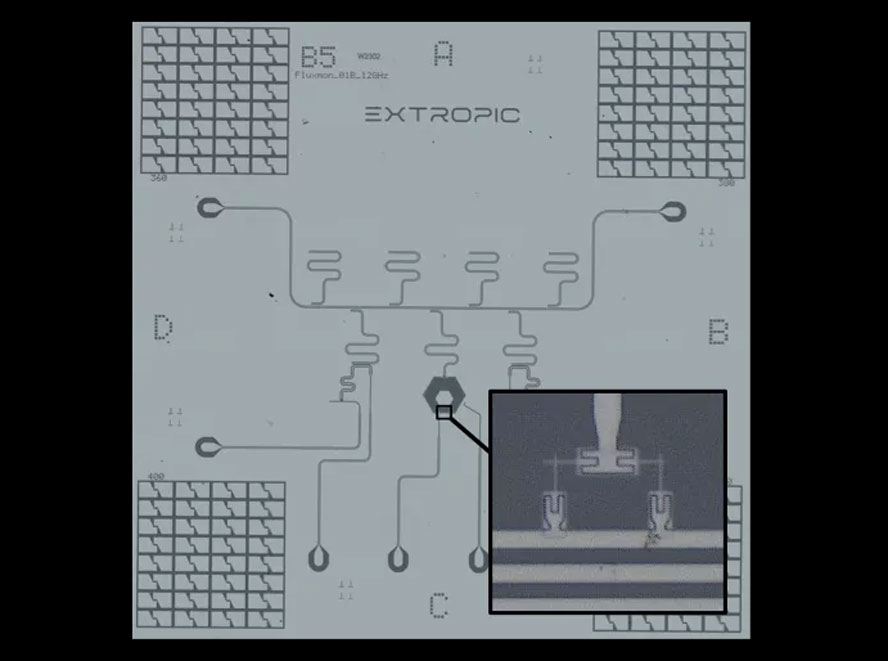AI startup Extropic emerges from stealth with superconducting processors it boldly claims will beat GPUs, CPUs, and TPUs
Welcome the thermodynamic future of AI acceleration.

A startup has just emerged from stealth mode, heralding its development and fabrication of a prototype superconducting processor for AI. The company, Extropic, recently closed a $14.1 million seed funding round, and claims it will achieve a goal of creating AI accelerators "that are many orders of magnitude faster and more energy efficient than digital processors (CPUs/GPUs/TPUs/FPGAs)." The firm, led by ex-Alphabet X quantum researcher Guillaume Verdon, has also published its "Litepaper" brief offering a tantalizing glimpse of the full-stack thermodynamic hardware platform it is building.
Extropic argues that currently available digital processors are not a good match for AI acceleration. The paper introduces a novel probabilistic paradigm of computing that is said to be distanced from increasingly complex pristine digital computers in favor of something more 'biological' and 'noisy'. Extropic's prototype passive thermodynamic chips run the type of probabilistic algorithms used in AI physically, as a rapid and energy-efficient physics-based process. This makes them much more suitable for current AI algorithms than traditional computing processors, which rather unnaturally try to embrace probability and uncertainty - introducing inefficiency.
There are many more discussions about the science behind Extropic's "revolutionary approach to AI acceleration through thermodynamic computing" in the paper. However, we were most interested to see the firm's demo chip, to hear how it works, and what it can do. In the image above you can see a microscope image of one of the first Extropic chip neuron designs. These chips are said to be nano-fabricated from aluminum and run at low temperatures so they are superconducting.
You can see two Josephson Junctions highlighted in the photo, and these should be adept transistor-style components for the types of complex non-linear problems faced by AI. What we see is just a small processor building block that will be used alongside many other linear and non-linear neurons in larger supercomputing systems.
That all might sound highly ambitious, but Extropic is also readying semiconductor devices that operate at room temperature to extend its reach to a larger and more immediate market opportunity. These devices will use transistors in the place of the Josephson Junctions, sacrificing energy efficiency but enabling the possibility of a GPU-like expansion card. Besides the hardware, Extropic is busy with software that interprets the abstract specifications of Energy-Based Models (EBMs) to its processors.
Helping founder Verdon achieve the above-outlined goals is a team of experts with prior experience at companies like Alphabet, AWS, Meta, IBM, and Nvidia. Let's hope we will hear more from Extropic in the near future.
Get Tom's Hardware's best news and in-depth reviews, straight to your inbox.

Mark Tyson is a news editor at Tom's Hardware. He enjoys covering the full breadth of PC tech; from business and semiconductor design to products approaching the edge of reason.
-
vanadiel007 I feel a song coming up: another one bites the dust from Queen.Reply
I just knew we were back on another round of super conductor articles. -
thisisaname Hype ready for the next funding around, $14.1 million is next to nothing when it comes to chips.Reply -
JTWrenn Welcome to the new tech bubble. Tons of money will be poured onto all of these ideas. Loads of investment capital will go into finding the next Nvidia. 99% will all fail. Everything will stay about the same with a few new startups will get purchased by the big players.Reply
The descriptions of this alone sound so tech bubble bs hyped that I wouldn't believe a word they say. -
Rakanyshu I'll get a turtleneck and promise that with the "magic of technology" every dollar you send me will be multiplied... all this over hyped startups remind me of the ministers making the big bucks... no one is making you pay for it anyway.Reply -
Geef I think the guy doing this is the third half cousin to the maker of Star Citizen! :ROFLMAO:Reply -
das_stig Extropic argues that currently available digital processors are not a good match for AI acceleration. The paper introduces a novel probabilistic paradigm of computing that is said to be distanced from increasingly complex pristine digital computers in favor of something more 'biological' and 'noisy'. Extropic's prototype passive thermodynamic chips run the type of probabilistic algorithms used in AI physically, as a rapid and energy-efficient physics-based process. This makes them much more suitable for current AI algorithms than traditional computing processors, which rather unnaturally try to embrace probability and uncertainty - introducing inefficiency.Reply
and at this point my brain rebooted due to sound bite overload, give me the money pitch. -
Diogene7 There is research in the emerging field of probabilistic computing (p-bit computing). One other option is to use spintronics related technologies, especially technologies derived from Non-Volatile-Memory (NVM) MRAM.Reply
MRAM use Magnetic Tunnel Junctions (MTJ), and one option to create p-bit computing is to tune MRAM MTJ to use their stochastic behaviour : sMTJ.
I think that spintronics related technologies are a growing field, and can easierly be integrated with CMOS technology, and open plenty new opportunities : IMO it is clearly the next step after silicon CMOS technology (beyond CMOS technology).
Much, much more funding for the CHIPS Act should be allocated to kick-start spintronics High Volume Manufacturing (HVM)
